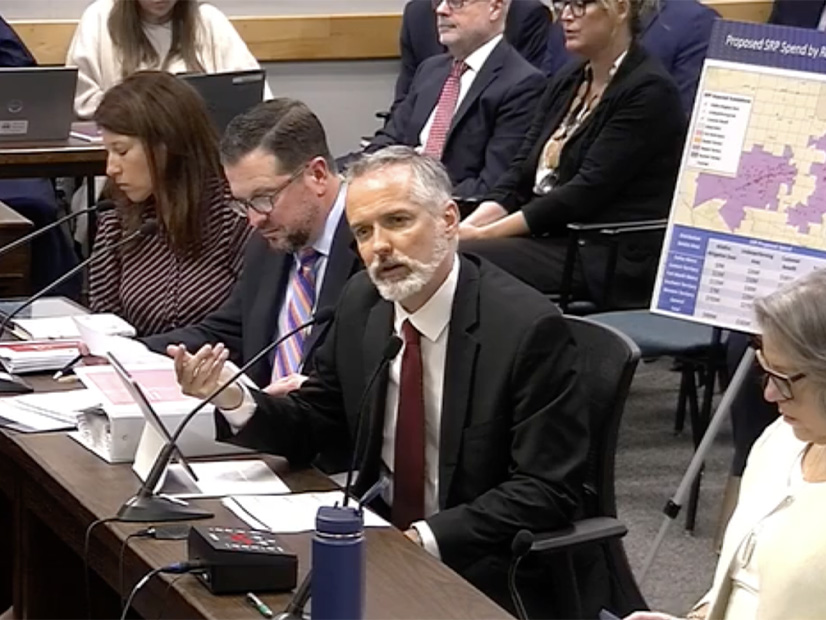PUC Hears State’s First System Resiliency Plan, Filed by Oncor
The Texas Public Utility Commission postponed action on Oncor Electric Delivery’s resiliency plan, the first from a state utility under new legislation, during its Oct. 24 open meeting.
Commissioner Jimmy Glotfelty asked for more time before approving, modifying or denying Oncor’s three-year system resiliency plan. The commissioners — meeting without Lori Cobos, who was excused following a death in her family — agreed to postpone a decision until its Nov. 14 open meeting (56545).
“This proceeding is the first of its kind, and I would like to request additional time to consider the plan, the agreed modifications and Oncor’s responses to any questions from the commissioners,” he said in a pre-meeting memo.
Texas House Bill 2555 directed the state’s transmission and distribution utilities to strengthen the resiliency of their systems. Oncor said its resiliency plan is “comprehensive and forward-looking” to proactively withstand, mitigate or quickly recover from the “historical and evolving resiliency events” it expects to affect its system.
An administrative law judge approved the Oncor plan in September, finding it in the public interest.
Brian Lloyd, Oncor’s vice president of regulatory policy, told the PUC that a “constructive” settlement agreement with commission staff and several other parties gives the utility an opportunity to bring forward some of the plan’s spending into this year.
He said the utility mapped its entire distribution system against all extreme weather events since 1998, including extreme heat and cold, major storms and wildfires. Oncor has identified wildfire risk as a major threat to the distribution system; with much of Texas suffering from drought conditions, Lloyd appeared eager to put the plan into effect.
“We have had red flag days on our system this week,” he said. “The state is dry. We know that we are ready to go to further address that risk. As soon as you are comfortable with this, do so.”
Oncor said it’s limiting its recovery of the plan’s capital costs to $2.8 billion and another $521 million in incremental operations and maintenance expenses for 2024-2028. It will defer $309 million in capital costs and O&M expenses to a fourth system resiliency plan year.
Commission Delays Decision on CenterPoint
The PUC agreed to put off a decision on CenterPoint Energy’s attempt to withdraw a $60 million rate case until the commission’s next open meeting on Nov. 14 (56211).
PUC Chair Thomas Gleeson said he had been ready to reach a decision during the meeting but no longer was prepared to do so. He suggested to his fellow commissioners that they rule on CenterPoint’s request no later than the next open meeting.
“I still have some things I need to work through, because I’m still not sure which way to come down on this, honestly,” he said. “I think there are really good points on both sides.”
CenterPoint said withdrawing the rate case, originally filed in March, and refiling it next year would allow it to use 2024 as the test year. An administrative law judge denied CenterPoint’s request to withdraw the rate case in August. The utility then appealed the decision to the PUC.
Gleeson said that during a recent public hearing in Houston, residents expressed a desire for the PUC to evaluate CenterPoint’s performance during and after Hurricane Beryl. The Category 1 storm knocked out power to nearly 3 million customers in the Houston area. CenterPoint was castigated for its poor communications during a recovery effort that lasted more than a week. (See Texas Politicos, Residents Bash CenterPoint.)
“One way to [evaluate CenterPoint’s performance] is to allow them to withdraw this case and then force them to file sometime in 2025 with the 2024 test year, where we could hear evidence about performance during Beryl and their infrastructure improvements,” he said.
CenterPoint associate general counsel Patrick Peters told the PUC that allowing the utility to withdraw from the rate case would allow it to focus on its work improving resiliency and restoring public trust. He said the utility then would be able to incorporate its learnings from Beryl into a new rate case.
Politicians, including Houston Mayor John Whitmire, and several consumer groups have called for a rate decrease and oppose the withdrawal.
The commission also declined to act on CenterPoint’s proposed 138-kV line in a high-growth region north of Houston. The utility said the line is necessary to address the strained existing system, but it has run into opposition from local residents (55768).
At the same time, the PUC rejected CenterPoint’s settlement with commission staff, the city of Houston and the Gulf Coast Coalition of Cities to adjust the utility’s system-average interruption duration index (SAIDI) and system-average interruption frequency index (SAIFI). Gleeson said the utility’s continued use of a one-minute threshold for the next seven years is “incongruous” with improved technology that “already addressed the issue” (55361).
Processes Set for Permian Projects
The commissioners approved staff’s plans to streamline and expedite the selection of transmission companies responsible for building projects in the Permian Basin Reliability Plan (57152).
Staff recommended a bifurcated contested case system where projects without disputes between transmission service providers (TSPs) and ERCOT over the responsibility for building lines and facilities would be grouped together in one proceeding.
TSPs with disputes will be able to file petitions for authorization to file for permits. Multiple petitions for the same project will be merged into a single contested case proceeding “as soon as practicable.” If necessary, the state Office of Administrative Hearings will hold hearings on the dispute.
ERCOT has laid out suggested principles it would follow in determining ownership of the plan’s projects.
The PUC approved the plan in September. It includes 765-kV and 345-kV infrastructure to support the region’s current and future power needs and new and upgraded local projects, as well as eight new import paths that will bring more power to the petroleum-rich region. (See Texas PUC Approves Permian Reliability Plan.)




